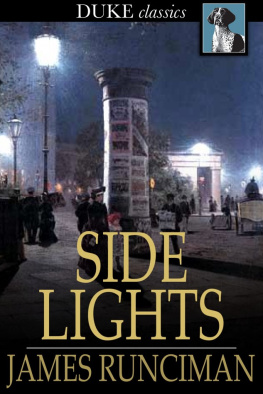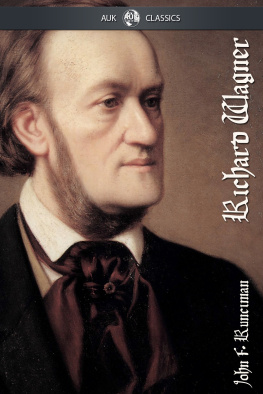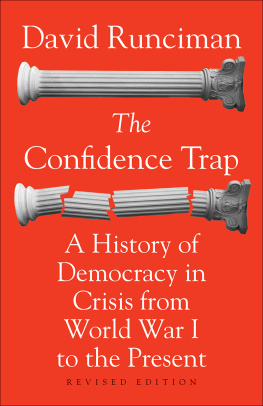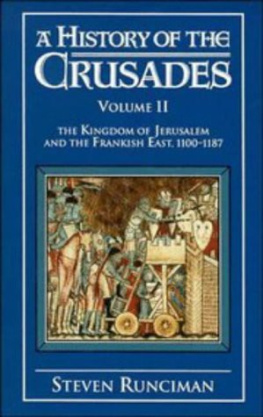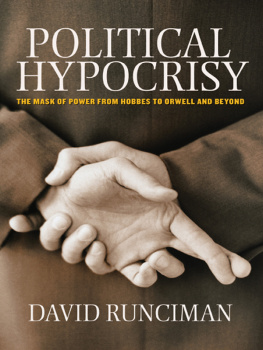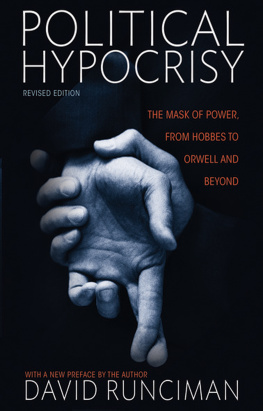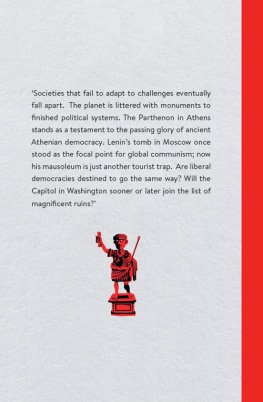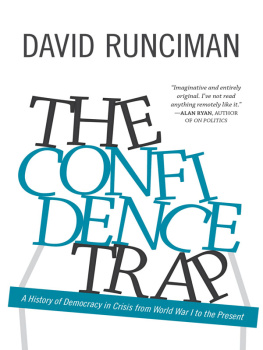James Runciman - Side Lights
Here you can read online James Runciman - Side Lights full text of the book (entire story) in english for free. Download pdf and epub, get meaning, cover and reviews about this ebook. year: 2015, publisher: Duke Classics, genre: Science. Description of the work, (preface) as well as reviews are available. Best literature library LitArk.com created for fans of good reading and offers a wide selection of genres:
Romance novel
Science fiction
Adventure
Detective
Science
History
Home and family
Prose
Art
Politics
Computer
Non-fiction
Religion
Business
Children
Humor
Choose a favorite category and find really read worthwhile books. Enjoy immersion in the world of imagination, feel the emotions of the characters or learn something new for yourself, make an fascinating discovery.
- Book:Side Lights
- Author:
- Publisher:Duke Classics
- Genre:
- Year:2015
- Rating:3 / 5
- Favourites:Add to favourites
- Your mark:
- 60
- 1
- 2
- 3
- 4
- 5
Side Lights: summary, description and annotation
We offer to read an annotation, description, summary or preface (depends on what the author of the book "Side Lights" wrote himself). If you haven't found the necessary information about the book — write in the comments, we will try to find it.
Born in Northumberland in 1852, James Runciman was trained as a teacher and spent many years working as an educator. Once established in his career, he began penning personal essays and opinion pieces in his spare time. This collection brings together a number of his works on topics ranging from marriage to the ethics of writing.
Side Lights — read online for free the complete book (whole text) full work
Below is the text of the book, divided by pages. System saving the place of the last page read, allows you to conveniently read the book "Side Lights" online for free, without having to search again every time where you left off. Put a bookmark, and you can go to the page where you finished reading at any time.
Font size:
Interval:
Bookmark:

First published in 1893
ISBN 978-1-63421-555-8
Duke Classics
2015 Duke Classics and its licensors. All rights reserved.
While every effort has been used to ensure the accuracy and reliability of the information contained in this edition, Duke Classics does not assume liability or responsibility for any errors or omissions in this book. Duke Classics does not accept responsibility for loss suffered as a result of reliance upon the accuracy or currency of information contained in this book.
I knew James Runciman but little, and that little for the most partin the way of business. But no one could know that ardent and eagersoul at all, no matter how slightly, without admiring and respectingmuch that was powerful and vigorous in his strangely-compoundedpersonality. His very look attracted. He had human weaknesses nota few, but all of the more genial and humane sort; for he wasessentially and above everything a lovable man, a noble, interesting,and unique specimen of genuine, sincere, whole-hearted manhood.
He was a Northumbrian by birth, "and knew the Northumbrian coast,"says one of his North-Country friends, "like his mother's face." Hisbirthplace was at Cresswell, a little village near Morpeth, where hewas born in August, 1852, so that he was not quite thirty-nine when hefinally wore himself out with his ceaseless exertions. He had a trueNorth-Country education, too, among the moors and cliffs, and theredrank in to the full that love of nature, and especially of the sea,which forms so conspicuous a note in his later writings. Heather andwave struck the keynotes. A son of the people, he went first, in hisboyhood, to the village school at Ellington; but on his eleventhbirthday he was removed from the wild north to a new world atGreenwich. There he spent two years in the naval school; andstraightway began his first experiences of life on his own account asa pupil teacher at North Shields Ragged School, not far from hisnative hamlet.
"A worse place of training for a youth," says a writer in TheSchoolmaster, "it would be hard to discover. The building wasunsuitable, the children rough, and the neighbourhood vileand thelong tramp over the moors to Cresswell and back at week ends was,perhaps, what enabled the young apprentice to preserve his health ofmind and body. His education was very much in his own hands. Hemanaged in a few weeks to study enough to pass his examinations withcredit. The rest of his time was spent in reading everything whichcame in his way, so that when he entered Borough-road in January,1871, he was not only almost at the top of the list, but he was thebest informed man of his year. His fellow candidates remember even nowhis appearance during scholarship week. Like David, he was ruddy ofcountenance, like Saul he towered head and shoulders above the rest,and a mass of fair hair fell over his forehead. Whene'er he took hiswalks abroad he wore a large soft hat, and a large soft scarf, andcarried a stick that was large but not soft."
To this graphic description I will add a second one. "He was asplendid all-round athlete," says another friend, who knew him at thistime, in the British and Foreign School Society's London college. "Sixfeet two or three in height, and with a fine muscular development, hecould box, wrestle, fence, or row with all comers, and beat them withridiculous ease. No one could have been made to believe that he woulddie, physically worn out, before he was forty. His intellectualmastery was as unquestioned as his physical superiority; he alwaystopped the examination lists, to the chagrin of some of the lecturers,whom he teased sadly by protesting against injustice the moment itpeeped out, by teaching all the good young men to smoke prodigiously,by scattering revolutionary verses about the college, and finally bycollecting and burning in one grand bonfire every copy of an obnoxioustext-book under which the students had long suffered."
This was indeed the germ of the man as we all knew him long afterwards.
Runciman left the college to take up the mastership of a London BoardSchool in a low part of Deptford; and here he soon gained anextraordinary influence over the population of one of the worst slumsin London. Mr. Thomas Wright, the "Journeyman Engineer," has alreadytold in print elsewhere the story of Runciman's descent into thedepths of Deptford, how he set about humanising the shoeless,starving, conscience-little waifs who were drafted into his school,and how, before many months had passed, he never walked through thesqualid streets of his own quarter without two or three loving littlefellows all in tatters trying to touch the hem of his garment, while agroup of the more timid followed him admiringly afar off. From thechildren, his good influence extended to the parents; and it was analmost every-day occurrence for visitors from the slums to burst intothe school to fetch the master to some coster who was "a-killin' hiswoman." The brawny young giant would dive into the courts where thepolice go in couples, clamber ricketty stairs, and "interview" thefighting pair. "His plan was to appeal to the manliness of theoffender, and make him ashamed of himself; often such a visit ended ina loan, whereby the 'barrer' was replenished and the surly husband setto work; but if all efforts at peacemaking were useless, this newapostle had methods beyond the reach of the ordinary missionaryhewould (the case deserving it) drop his mild, insinuating, persuasivetones, and not only threaten to pulp the incorrigible blackguard intoa jelly, but proceed to do it."
Runciman, however, was much more in fibre than a mere schoolmaster. Heworked hard at his classes by day; he worked equally hard by night athis own education, and at his first attempts at journalism. Hematriculated at London University, and passed his first B.Sc.examination. At one and the same time he was carrying on his ownschool, in the far East End, contributing largely to an educationalpaper, The Teacher, and writing two or three pages a week inVanity Fair, which he long sub-edited. His powers of work wereenormous, and he systematically overtaxed them.
It is not surprising that, under this strain and stress, even thatmagnificent physique showed signs of breaking down, like every otherwriter's. A long holiday on the Mediterranean, and another at Torquay,restored him happily to his wonted health; but he saw he must nowchoose between schoolmastering and journalism. To run the two abreastwas too much, even for James Runciman's gigantic powers. Permanentwork on Vanity Fair being offered to him on his return, he decidedto accept it; and thenceforth he plunged with all the strength andardour of his fervid nature into his new profession.
"It was during this period of insatiable greed for work," says thecorrespondent of a Nottingham journal, "that I first knew him. You maywonder how he could possibly get through the tasks which he sethimself. You would not wonder if you had seen him, when he was in thehumour, tramp round the room and pour out a stream of talk on men andbooks which might have gone direct into print at a high marketablevalue. The London correspondent of a Nottingham paper says thatRunciman was justly vain of the speed of his pen. That is true. Heconsidered that a journalist ought to be able to dictate an article atthe rate of 150 words a minute to a shorthand writer. I doubt whetheranybody can do that, but Runciman certainly thought he could. He lovedto settle a thing off on the instant with one huge effort. Here is anauthentic story that shows his method. It is a physical performance,but he tackled journalistic obstacles in the same spirit:
Font size:
Interval:
Bookmark:
Similar books «Side Lights»
Look at similar books to Side Lights. We have selected literature similar in name and meaning in the hope of providing readers with more options to find new, interesting, not yet read works.
Discussion, reviews of the book Side Lights and just readers' own opinions. Leave your comments, write what you think about the work, its meaning or the main characters. Specify what exactly you liked and what you didn't like, and why you think so.

